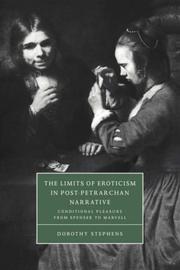| Listing 1 - 1 of 1 |
Sort by
|

ISBN: 0521034698 1280161868 0511117051 0511150024 051130997X 051148402X 0511050968 0511004923 9780511004926 0511035721 9780511035722 9780511050961 9780511117053 9780521630641 0521630649 9780511484025 9780521034692 Year: 1998 Publisher: Cambridge [England] ; New York : Cambridge University Press,
Abstract | Keywords | Export | Availability | Bookmark
 Loading...
Loading...Choose an application
- Reference Manager
- EndNote
- RefWorks (Direct export to RefWorks)
Although theories of exploitation and subversion have radically changed our understanding of gender in Renaissance literature, to favour only those theories is to risk ignoring productive exchanges between 'masculine' and 'feminine' in Renaissance culture. 'Appropriation' is too simple a term to describe these exchanges - as when Petrarchan lovers flirt dangerously with potentially destructive femininity. Spenser revises this Petrarchan phenomenon, constructing flirtations whose participants are figures of speech, readers or narrative voices. His plots allow such exchanges to occur only through conditional speech, but this very conditionality powerfully shapes his work. Seventeenth-century works - including a comedy by Jane Cavendish and Elizabeth Brackley, and Upon Appleton House by Andrew Marvell - suggest that the civil war and the upsurge of female writers necessitated a reformulation of conditional erotics.
English poetry --- Narrative poetry, English --- Erotic poetry, English --- Feminism and literature --- Renaissance --- Sex in literature. --- Literature --- English erotic poetry --- History and criticism. --- History. --- Italian influences. --- Women authors --- Petrarca, Francesco, --- Spenser, Edmund, --- Marvell, Andrew, --- A. M. --- M., A. --- Marvel, Andrew, --- Protestant, --- Rivetus, Andreas, --- Immerito, --- Spencer, Edmund, --- Spenser, Edmond, --- Pétrarque --- Petrarch --- Petracco, Francesco --- Petrarca, Francesco (1304-1374) --- Influence. --- Technique. --- Petrarca, Franciscus, --- Petrarch, --- Petrarch, Francesco, --- Petrarcha, Franciscus, --- Petrark, --- Petrarka, Franchesko, --- Peṭrarḳa, Frants'esḳo, --- Pétrarque, --- Петрарка, Франческо, --- פטררקא, פרנצ׳סקו --- Arts and Humanities --- Petrarca, Francesco --- Literature and feminism
| Listing 1 - 1 of 1 |
Sort by
|

 Search
Search Feedback
Feedback About UniCat
About UniCat  Help
Help News
News